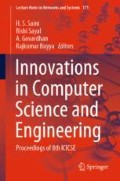Abstract
Cloud computing provides useful services to users with extensive and scalable resources that virtualized over the internet. It defined as a collection of the communication and computing resources located in the data-center. The service based on on-demand is subject to QoS, the load balance, and certain other constraints with a direct effect on the user’s consumption of resources that are controlled by this cloud infrastructure. It is considered a popular method as it has several advantages that have been provided by a cloud infrastructure. The cloud scheduling algorithm’s primary goal was to bring down the time taken for completion (the cost of execution) of the task graph. The start time and the finish time for the task node influence the task graph completion completed to the time (the cost). The task node sort order an essential aspect that influences the start time and the finish time for every task node. In a hybrid cloud, efficient dense particle mass-based cloud scheduling is efficient because users need to maintain the security of the hybrid cloud. Different algorithms with different algorithms suggested by researchers in the cloud. This paper proposes particle swarm optimization (PSO)-based cloud optimal scheduling. Effective results obtained in an efficient fuzzy mass-based PSO cloud scheduling.
Access this chapter
Tax calculation will be finalised at checkout
Purchases are for personal use only
References
Ge, J.W., Yuan, Y.S.: Research of cloud computing task scheduling algorithm based on improved genetic algorithm. Appl. Mech. Mater. 347, 2426–2429 (2013)
Li, K., Xu, G., Zhao, G., Dong, Y., Wang, D.: Cloud task scheduling based on load balancing ant colony optimization. Sixth Annu. Chinagrid Conf. 2011, 3–9 (2011). https://doi.org/10.1109/ChinaGrid.2011.17
Kousalya, K.: To improve ant algorithm’ s grid scheduling using local search. Int. J. Comput. Cogn. 7, 47–57 (2009)
Bagherzadeh, J., MadadyarAdeh, M.: An improved ant algorithm for grid scheduling problem using biased initial ants. In: 3rd International Conference on Computer Research and Development, pp. 373–378 (2011). https://doi.org/10.1109/CSICC.2009.5349368
Chen, W.-N., Zhang, J.Z.J.: An ant colony optimization approach to a grid workflow scheduling problem with various QoS requirements. IEEE Trans. Syst. Man Cybern. Part C (Appl. Rev.) 39, 29–43 (2009). https://doi.org/10.1109/TSMCC.2008.2001722
Chen, W.-N., Zhang, J., Yu, Y.: Workflow scheduling in grids: an ant colony optimization approach. IEEE Congr. Evol. Comput. 3308–3315 (2007)
Chen, W., Shi, Y., Zhang, J.: An ant colony optimization algorithm for the time-varying workflow scheduling problem in grids. IEEE Congr. Evol. Comput. 875–880 (2009)
Chiang, C.-W., Lee, Y.-C., Lee, C.-N., Chou, T.-Y.: Ant colony optimisation for task matching and scheduling. IEE Proc. Comput. Digit. Tech. 153, 373–380 (2006). https://doi.org/10.1049/ip-cdt
Chimakurthi, L., Madhu Kumar, S.: Power efficient resource allocation for clouds using ant colony framework. Available from arXiv:11022608 (2011)
Dam, S., Mandal, G., Dasgupta, K., Dutta, P.: An ant colony based load balancing strategy in cloud computing. Adv. Comput. Netw. Inform. 2, 403–413 (2014). https://doi.org/10.1007/978-3-319-073507
Feller, E., Rilling, L., Morin, C.: Energy-aware ant colony based workload placement in clouds. In: Proceedings of 12th IEEE/ACM International Conference on Grid Computing, pp. 26–33 (2011). https://doi.org/10.1109/Grid.2011.13
Ferdaus, M.H., Murshed, M., Calheiros, R.N., Buyya, R.: Virtual machine consolidation in cloud data centers using ACO metaheuristic. In: Euro-Par 2014 Parallel Process, pp. 306–317. Springer (2014). https://doi.org/10.1007/978-3-319-09873-9
Hu, Y., Xing, L., Zhang, W., Xiao, W., Tang, D.: A knowledge-based ant colony optimization for a grid workflow scheduling problem. In: Adv. Swarm Intell. Notes Comput. Sci. 241–248 (2010). https://doi.org/10.1007/978-3-642-38703-6
Khan, S., Sharma, N.: Effective scheduling algorithm for load balancing (SALB) using ant colony optimization in cloud computing. Int. J. Adv. Res. Comput. Sci. Softw. Eng. 4, 966–973 (2014)
Liu, A.L.A., Wang, Z.W.Z.: Grid task scheduling based on adaptive ant colony algorithm. In: International Conference on Management e-Commerce eGovernment, pp. 415–418. IEEE (2008). https://doi.org/10.1109/ICMECG.2008.50
Liu, X., Zhan, Z., Du, K., Chen, W.: Energy aware virtual machine placement scheduling in cloud computing based on ant colony optimization. In: Proceedings of Conference on Genetic and Evolution Computing, pp. 41–47. ACM (2014). https://doi.org/10.1145/2576768.2598265
Lu, X., Gu, Z.: A load-adapative cloud resource scheduling model based on ant colony algorithm. In: IEEE International Conference on Cloud Computing Intelligent System 2011, pp. 296–300. https://doi.org/10.1109/CCIS.2011.6045078
Mathiyalagan, P., Suriya, S., Sivanandam, S.N.: Modified ant colony algorithm for grid scheduling. Int. J. Comput. Sci. Eng. 02, 132–139 (2010)
Nishant, K., Sharma, P., Krishna, V., Gupta, C., Singh, K.P., Nitin, et al.: Load balancing of nodes in cloud using ant colony optimization. In: UKSim 14th International Conference on Computing Model Simulation, pp. 3–8 (2012). https://doi.org/10.1109/UKSim.2012.11
Pacini, E., Mateos, C., Garino C.G.: Balancing throughput and response time in online scientific clouds via ant colony optimization. Adv. Eng. Softw. 84, 31–47 (2015)
Tawfeek, M.A., El-Sisi, A., Keshk, A.E., Torkey, F.A.: Cloud task scheduling based on ant colony optimization. In: 8th International Conference on Computer Engineering System, pp. 64–69 (2013). https://doi.org/10.1109/ICCES.2013.6707172
Wen, X., Huang, M., Shi, J.: Study on resources scheduling based on ACO algorithm and PSO algorithm in cloud computing. In: Proceedings of 11th International Symposium Distribution Computing Application to Business Engineering Science, pp. 219–222 (2012). https://doi.org/10.1109/DCABES.2012.63
Zhang, Z., Zhang, X.: A load balancing mechanism based on ant colony and complex network theory in open cloud computing federation. Int. Conf. Ind. Mechatron. Autom. 2, 240–243 (2010). https://doi.org/10.1109/ICINDMA.2010.5538385
Author information
Authors and Affiliations
Corresponding author
Editor information
Editors and Affiliations
Rights and permissions
Copyright information
© 2021 The Author(s), under exclusive license to Springer Nature Singapore Pte Ltd.
About this paper
Cite this paper
Sirisati, R.S., Vishnu Vardhana Rao, M., Dilli Babu, S., Narayana, M.V. (2021). An Energy-Efficient PSO-Based Cloud Scheduling Strategy. In: Saini, H.S., Sayal, R., Govardhan, A., Buyya, R. (eds) Innovations in Computer Science and Engineering. Lecture Notes in Networks and Systems, vol 171. Springer, Singapore. https://doi.org/10.1007/978-981-33-4543-0_79
Download citation
DOI: https://doi.org/10.1007/978-981-33-4543-0_79
Published:
Publisher Name: Springer, Singapore
Print ISBN: 978-981-33-4542-3
Online ISBN: 978-981-33-4543-0
eBook Packages: Intelligent Technologies and RoboticsIntelligent Technologies and Robotics (R0)

